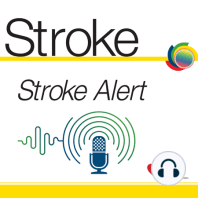17 min listen
Stroke Alert March 2021
FromStroke Alert
ratings:
Length:
17 minutes
Released:
Mar 12, 2021
Format:
Podcast episode
Description
On Episode 2 of the Stroke Alert podcast, host Dr. Negar Asdaghi highlights two featured articles from the March 2021 issue of Stroke. This episode also features a conversation with Dr. Joan Montaner from Neurovascular Research Laboratory at the Universitat Autònoma in Barcelona, Spain, to discuss his article “D-Dimer as Predictor of Large Vessel Occlusion in Acute Ischemic Stroke.” Dr. Negar Asdaghi: Can your microRNA profile predict your future risk of stroke? Is stroke that wake-up call to finally live a healthier lifestyle, better diet, exercise more, and stop smoking? Can a simple blood test improve our clinical predictive models for presence of a large vessel occlusion in patients with suspected ischemic stroke? We have the answers and much more in today's podcast. You're listening to Stroke Alert. Stay with us. Dr. Negar Asdaghi: From the Editorial Board of Stroke, welcome to the Stroke Alert Podcast. My name is Negar Asdaghi. I'm an Associate Professor of Neurology at the University of Miami, Miller School of Medicine, and the host of the monthly Stroke Alert Podcast. In today's podcast, I'm going to interview the senior author of the study on the values of D-dimer and predicting the presence of large vessel occlusion in stroke. But first with these two articles. Dr. Negar Asdaghi: DNA noncoding sequences and introns, once thought to represent the, quote, junk DNA, quote, have been found to play an important role in the modulation of gene expression at the post transcriptional level through coding for regulatory molecules, such as microRNAs, or miRNA. Whether the presence of certain miRNAs can signal a future risk of development of stroke is unknown. In their paper titled “Circulatory MicroRNAs as Potential Biomarkers for Stroke Risk: The Rotterdam Study,” Dr. Michelle Mens and colleagues from the Department of Neurology, University Medical Center, in Rotterdam, Netherlands, discuss their findings related to microRNA samples collected between 2002 and 2005 from over 1900 stroke-free participants of the Rotterdam Study. Participants were assessed for incident stroke through continuous monitoring of medical records until January 1, 2016. Dr. Negar Asdaghi: At baseline, using next-generation sequencing, they measured expression levels of over 2083 miRNAs in plasma samples. During a mean follow-up of close to 10 years, the incidence of stroke was 7% in their study population, and they found, in total, 39 miRNAs were at least nominally related with that incidence of stroke. In their fully adjusted model, they found significant association between expression level of three particular microRNAs and risk of stroke, with the hazard ratio ranging between 1.1 to 2.6. Interestingly, the area under the curve for the longitudinal predictive models improved when the miRNA data was added to the vascular risk factor model. And in conclusion, they found miRNA 6124, 5196-5p and 4292 were associated with future risk of stroke in their population. The elevated levels of these miRNAs may serve as plasma biomarkers for predicting future risk of stroke in combination with other known vascular risk factors for stroke. Dr. Negar Asdaghi: So, speaking of vascular risk factors, let's move on to our second paper for today's podcast. There's a growing emphasis on adherence with pharmaceutical interventions, such as diabetic and blood pressure treatments, statin therapy, to control the risk factors for stroke and prevent recurrent vascular events. All the while, the non-pharmaceutical interventions, such as smoking cessation, diet control, and increased physical activity, seem to represent the somewhat easy or implied aspect of our secondary preventive efforts. But how well are stroke survivors doing with regards to making these healthy lifestyle modifications? In the March issue of Stroke, Dr. Chelsea Liu and colleagues from Johns Hopkins School of Public Health presented their findings on lifestyle
Released:
Mar 12, 2021
Format:
Podcast episode
Titles in the series (39)
Stroke Alert March 2021: Monthly summary & analysis of selected research published in the Stroke journal by Stroke Alert
